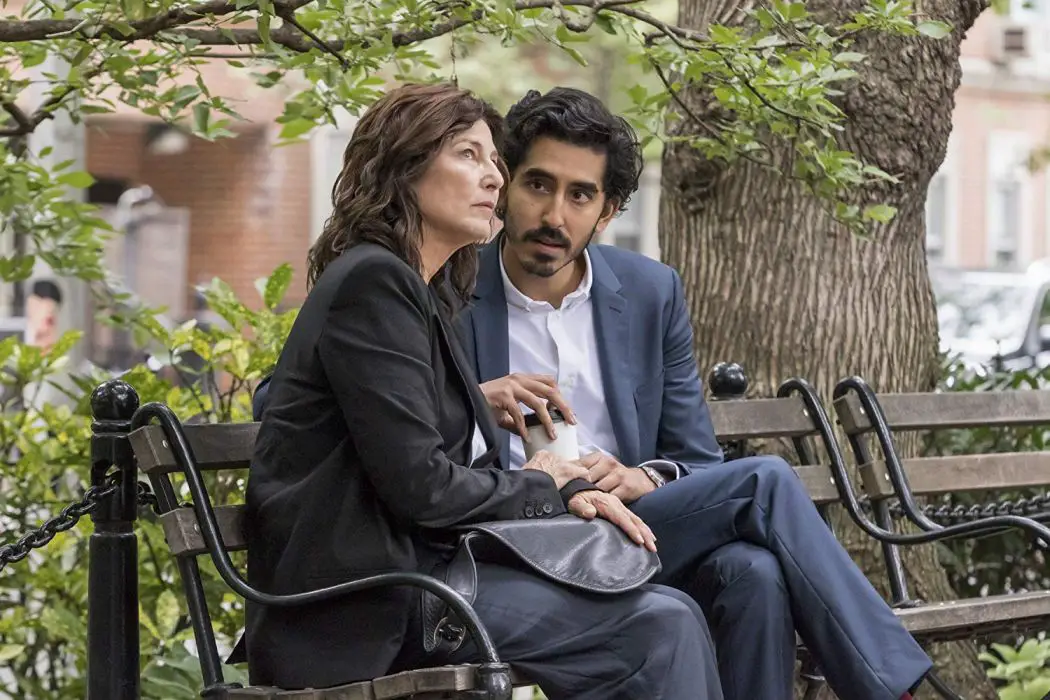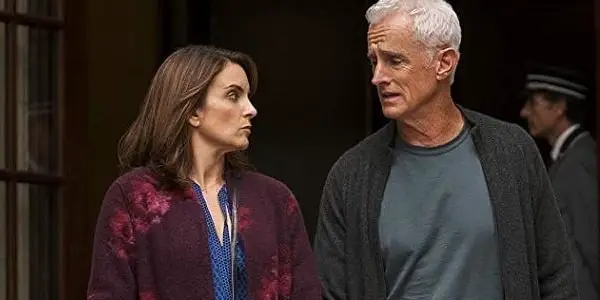MODERN LOVE Season 1: A Tasty, But Undercooked Anthology Series

Hailing from New York, Tom is an avid film lover…
Amazon has teamed up with writer/director John Carney, the man behind Begin Again, Once, and Sing Street, for an anthology series based on a New York Times column about romance in our current times. Each episode is essentially its own romantic vignette, containing soaring highs and destructive lows for the characters in its narrative. Unfortunately, a tremendous cast and creative team can’t help Modern Love from feeling a bit undercooked.
Love Isn’t Always Pretty
Fortunately, there are a few episodes that I found to be extremely engaging and emotionally satisfying. The first of which is episode two, “When Cupid is a Prying Journalist”. It follows a romance app developer, Dev Patel, who is being interviewed by a seasoned journalist for an article, Catherine Keener. He’s simply asked if he’s ever been in love and it sparks a conversation that pries the pasts of both of them wide open. Both Keener and Patel are especially good here, showcasing a believable and comfortable chemistry that makes them wonderful to watch. Their respective romantic pasts are heartbreaking and immersive, leaving the viewer on the edge of their seat. The coupling of their performances and the story that envelops them makes for a terrific episode.
Episode 3, “Take Me As I Am, Whoever I Am”, is also a winner. It stars Anne Hathaway as a woman with bipolar disorder who is trying to navigate her love life after she meets a young gentleman at a supermarket that she fancies, Gary Carr. This was an episode that felt wholly original and was particularly emotional. Bipolar disorder is something that is rarely portrayed in romantic films, let alone an anthology series of the genre, and it was handled deftly here. Hathaway is impressive, specifically when her character goes from experiencing an incredible high to a bottoming low in a matter of seconds. She sells these transitions beautifully and this performance is easily one of her best. It’s less a story about romantic connection than it is about connection in general for someone with this disorder and I found myself genuinely wanting her to find it.

Episode 7, “Hers Was a World of One”, also has its merits. It stars Andrew Scott and Brandon Kyle Goodman as a gay couple who find a surrogate for a possible child in a young homeless woman, Olivia Cooke. This was another story I found to be refreshing and different, elevated further by strong performances from Scott and Goodman. They make a terrific pairing and the friction that forms between them as they come to blows with their new surrogate feels believable and grounded. Cooke is also a treat to watch as their surrogate, her dry delivery and charm seeping through each scene. The drama here doesn’t feel melodramatic or unearned and the performances prevent this story from faltering even when it begins to spin its wheels.
Episode 8, “The Race Grows Sweeter Near Its Final Lap”, is a fitting conclusion for the season. It follows a grieving elderly woman, Jane Alexander, who meets a new partner, James Saito, and falls in love, only to have to grieve again after he passes. This was not only a love story that was adorable, due in large part to winning performances from its two leads, but one that was ultimately uplifting. Grieving the love of your life is an unenviable task, but this story explores how two widows find their second chances in each other. This episode shows the resilience of the human spirit and how there are always different breeds of romantic love. This concluding chapter also gets points for tying in its earlier stories in a way that doesn’t feel forced, but cohesive and smooth.
Love Can Be Cringey
The series doesn’t exactly hit the ground running with its first installment, “When The Doorman Is Your Main Man”. It follows a young woman, played by the quirky and lovely Cristin Milioti, who runs each new romantic interest by her apartment building’s doorman for approval, played by Laurentiu Possa. Though Miliotti shines as she normally does, Possa comes off more as creepy and overprotective than he does warm and caring. This unfortunately creates a dynamic that is far more unsettling than it is heartwarming. This is an episode that wants to pull at your heartstrings, but when it tries to do so toward its end, it comes off as forced and manipulative.
Episode 4, “Rallying to Keep the Game Alive”, is an episode that had heaps of potential, but ultimately floundered. It stars Tina Fey and John Slattery as a married couple struggling to stay together as they try to work through their problems together and with a therapist. Fey and Slattery are fantastic, making for a wholly believable, failing married couple. The heartache in their eyes and in the timbre of their voices as they come to terms with who and where they are as a couple and as individuals is quite poignant. However, the pacing of this episode is sluggish, and the story feels muddled and unfocused. The result is an episode that is less than the sum of its parts, letting down two performers in fine form.

Episode 5, “At the Hospital, an Interlude of Charity”. is a total misfire. It stars Sofia Boutella and John Gallagher Jr. as a pair enjoying a date when things go horrible awry, landing the the latter in the hospital as they get to know one another further. This was a clunky episode that suffered from poor writing and storytelling. Boutella and Gallagher Jr. are talented actors, but the two have little to no chemistry here. Their connection feels forced and unearned and I found myself wanting to check out early on. It also doesn’t help that this story feels overlong and emotionally vacant. It’s an episode that makes you scratch your head wondering where it all went wrong.
Episode 6, “So He Looked Like Dad. It Was Just Dinner, Right?”, is also a disappointment. It focuses on a young woman, Julia Garner, who develops a relationship with a father-like figure from work, Shea Whigham. This was yet another installment that was ripe with promise, but ultimately buckled under its own ambition. It’s easy for the viewer to empathize with Garner’s character, having lost her father at an early age and yearning for that kind of parental comfort ever since. However, the way she goes about finding that kind of connection with her boss comes off as cold and manipulative. Garner and Whigham have a great easygoing chemistry with one another, but this is a story that made me squirm more than it made me smile. The empathy I had for Garner’s character at the start is completely vanquished by the episode’s end, which left me with a sour taste in my mouth.
Modern Love: Final Thoughts
Modern Love is an anthology series that is unfortunately a mixed bag. It has episodes that show its true potential fulfilled, but there aren’t enough of them to warrant a full recommendation. The cast is outstanding and formidable, but even their talent can’t overcome some shoddy and poorly constructed storytelling. If you’re looking for some comfort food binging this holiday season, this show may be just what the doctored ordered, but if you’re looking for something more substantial and filling, I would suggest looking elsewhere.
Have you watched Modern Love yet? If not, do you plan to? Let us know in the comment section below!
All episodes of Modern Love are now streaming on Amazon Prime.
Does content like this matter to you?
Become a Member and support film journalism. Unlock access to all of Film Inquiry`s great articles. Join a community of like-minded readers who are passionate about cinema - get access to our private members Network, give back to independent filmmakers, and more.
Hailing from New York, Tom is an avid film lover and reviewer who has been sharing his love for movies through his YouTube channel for over 10 years now. His favorite genres are comedy, thriller, mystery, and action. He also believes those who do not enjoy Back To The Future are human enigmas.













